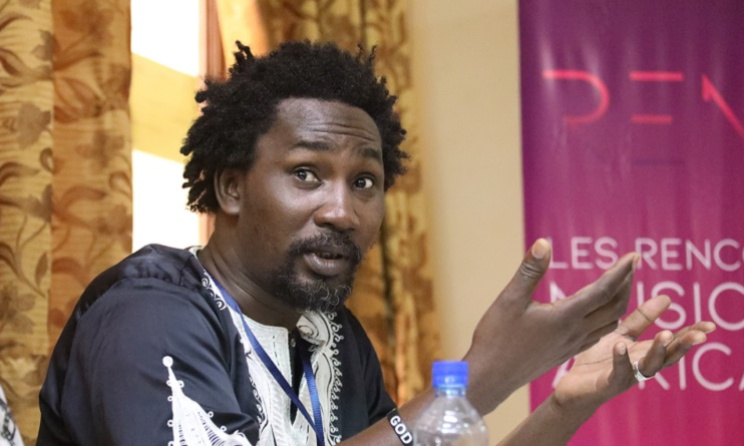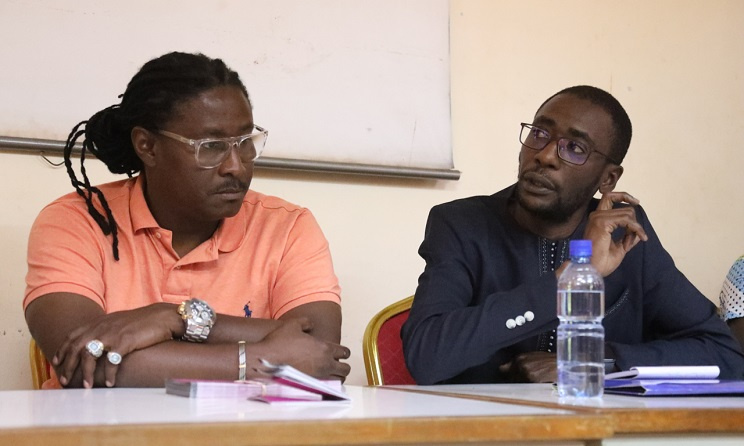Burkina Faso: REMA holds successful 2019 music conference
For a second year in a row, Les Rencontres Musicales Africaines (REMA), or 'African Music Meetings' in English, provided an occasion for music industry professionals to network and establish working relationships. The conference saw artists, music promoters, festival directors, media experts, producers, record label owners and representatives from distribution companies come together in Ouagadougou, Burkina Faso, from 13 to 15 June, to exchange ideas about the African music industry, and watch a number of local and international showcasing artists.
 Malayky from Ivory Coast. Photos: Boub Sidibe (Mali Buzz).
Malayky from Ivory Coast. Photos: Boub Sidibe (Mali Buzz). Alif Naaba.
Alif Naaba. Jose Da Silva.
Jose Da Silva. Abibou Sawadogo.
Abibou Sawadogo. Michele Beltan.
Michele Beltan. Didier Awadi and Cheick Traore.
Didier Awadi and Cheick Traore.
Topics up for discussion touched on capacity building and technical assistance for artists, elements which are seen as imperative in the push to increase revenue streams for Burkinabe musicians.
The head of Sony Music in Ivory Coast, José Da Silva, presented a talk titled Circuits and New Economic Models for African Music. He said Sony Music saw great potential in Africa, even though most countries still experienced infrastructure challenges and patchy copyright frameworks, which stifled effective music revenue generation. He argued that if the right frameworks were put in place, musicians would see and increase in digital revenue, thus bypassing older royalty models that relied almost exclusively on radio play.
"It's time to wake up and it's time for Africa to create a system that will benefit us," Da Silva, who is known for producing and distributing the late Cesaria Evora, said. "The African continent is changing. If Africa works well, the music industry will also work well."
Da Silva encouraged music professionals in Burkina Faso to attend Africa's music markets to bolster their knowledge and technical skills. He mentioned Atlantic Music Expo in Cape Verde, Marché des Arts et du Spectacle Africain (MASA) in Ivory Coast, Moshito in South Africa, IOMMA in Reunion and the pan-African ACCES conference as some of the leading music industry events on the continent.
REMA is organised by Burkinabe musician, producer and music promoter Alif Naaba, who advised artists to look towards emerging streaming markets for growth as opposed to physical album releases.
"There are many business opportunities for musicians in Africa, and the continent is becoming a market," he said. "With the development of the Internet, artists need to know where to sell and where to circulate for users to consume."
On 14 June, Michele Beltan from French company Believe Digital spearheaded a discussion about online music distribution. She profiled Believe Digital, a smart digital and physical distribution and marketing services for independent artists. The discussion also featured Youssou N’dour’s manager, Doudou Sarr, and the director-general of Burkina Faso's BF1 TV, Issoufou Sare, both of whom agreed that although record labels offered financial stability, it was more prudent for artists to take the independent route, which lets them retain the rights to their works.
Beltan also emphasised the importance of monetising streaming services and employing social networks to stream live performances, which would ensure daily interaction between artists and their fans.
On 15 July, Music In Africa junior editor for East Africa Lucy Ilado presented a talk on Kenyan caller ringback tones (CRBTs), which was followed by a discussion featuring rapper and Studio Sankara owner Didier Awadi (Senegal), deputy administrator of structure at Youssou N'dour's head office, Cheick Traore (Senegal), and the secretary-general of the Burkinabe Copyright Office, Moise Lanssa Kohoun.
Kohoun pledged to engage the relevant institutions to formulate a working structure for CRBTs, especially in regard to fostering negotiations with telcos on royalty rates and functional payout systems that would remunerate creators based on the split sheets submitted. Burkinabe artists were also challenged to set up a musicians' union whose leadership would engage the relevant authorities.
REMA also played host to five showcases at Ouagadougou's Paongo arts centre where performances were held by Winyo (Kenya), Malayky (Ivory Coast), Kile (Burkina Faso) and Pamika Le Star (Burkina Faso). But the highlight was Burkinabe traditional musician Abibou Sawadogo, who had the audience on its feet for the entire one-hour performance. Sawadogo's band uses syncopated rhythms and homemade instruments, as well as synchronised choreography on stage.
“This second edition of REMA was a real success and I salute the whole team that worked on its organisation,” Naaba told Music In Africa at the conclusion of the conference. “We were able to carry out all the activities that were on the programme, and the meetings saw the presence of several actors who were more than generous with their knowledge in the African music sector. The showcases offered a diversified programme, which the delegates and the public loved. We look forward to having an even better edition next year.”



























Commentaires
s'identifier or register to post comments